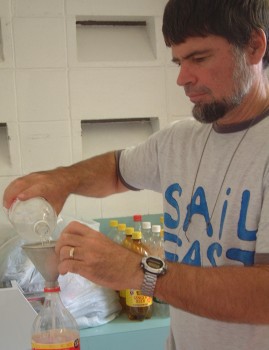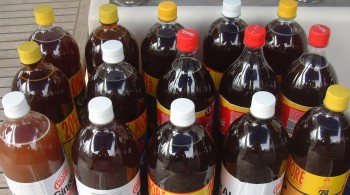
Sterilizing bottles with Sodium Metabisulfite
Coopers Bitter
 Sterilizing bottles with Sodium Metabisulfite |
We are only planning to be in Australia until late July, 2006, when we hope to join the Darwin-Indonesia Rally. Once we leave Oz, I don't expect to be able to buy these beer-kits again. Since I'd like to take perhaps a dozen beer-kits with me when we leave, I have to make all of my buying decisions fairly quickly. Therefore, and because I have enough bottles, I decided to brew up another batch of something different right away.
Saturday, 1 April 2006 - Preparation:
While I would love to brew up an Australian Pale Ale, the kit calls for "Coopers
Brew Enhancer #2", which doesn't seem to be easily available. I suspect
it's just a mix of dextrose, maltodextrin, and light dry malt, but I don't know
the proportions. Soooo, I decided to do a Coopers Bitter.
(OK, it was also on
sale ![]() )
)
For adjunct sugars, I again decided to go with the Coopers so-called "Brew Enhancer #1" dextrose/maltodextrin mix. In the future, I'd like to back off on the glucose/sucrose/dextrose type sugars and move towards more malt. But for the time being, I'm trying to decide which brew-kits do I want to buy and take with us when we leave Oz. Changing as few variables as I can should enable me to taste the true difference between, say, the Draught and the Bitter.
Saturday, 1 April 2006 - Coopers Bitter:
This mix proceeded very much like the last one, with the inevitable refinements
that come from repetition. Having all of the components listed on a
laminated sheet on the carboy made it much easier to know I had everything I
needed. Spent about 45 minutes rinsing, cleaning, sterilizing, and
re-rinsing everything, and this time I remembered to do the threads on the
valve. I did make 2 small changes from previous batches:
I again brought the full carboy back to Ocelot before adding the yeast. This allowed the (quite substantial) head that had developed while filling the carboy to settle, so the yeast when directly onto the liquid wort. It also meant that the yeast would tend to stay on the surface initially, and not get mixed into the wort by the agitation of bringing the carboy back on board. Original specific gravity was measured at 1.034, which is perhaps a bit low. The starting temperature of the wort was about 80°F (27°C) which is a bit high, so I left the carboy in the cockpit to cool down in the night air.
|
Sunday, 2 April 2006 - Fermenting:
Ahhh, I love it when the yeasties start going to work. Fermentation, as
seen by the water-trap bubbling, started after about 12 hours. The wort
continued "talking" to us (bubbling) for the next several days. It likes
to greet us every time we walk into the salon, as it usually lets off a "blub"
when we step next to it.
This time I tried to keep the wort cooler than before, moving it indoors during the day and sometimes moving it back into the cockpit to cool down at night. This has lead to my longest fermentation period yet, as it was still bubbling every few minutes even after 4 days, a good sign.
I also decided to get a bit more real about measuring the specific gravity before bottling. Apparently, yeast can continue to metabolize sugar even after the water-trap has stopped bubbling very much. I'm a bit concerned about the last batch of Draught as the containers are very tight (highly pressurized). I'm wondering if there were still some fermentable sugars left in the wort when I bottled, possibly leading to over-priming. The officially sanctioned way of determining the correct time to bottle is a stable specific gravity for 24 hours, not just a lack of bubbling.
 22.5 liters - not a bad harvest. The bottle on the left is lighter because it's the last one filled and has more yeast. |
Sunday, 9 April 2006 - Bottling:
This batch is surprisingly hard to get a Specific Gravity reading from.
The whole wort seems to be charged with tiny bubbles. These cling onto the
Hydrometer float, lifting it up and giving a falsely high reading. So I have to
leave the specific gravity sample for several minutes to let the bubbles go away, then bounce
the float several times to knock off any remaining bubbles before I can read it.
With an initial specific gravity of 1.034 and a final of 1.010, the net alcoholic content should be about:
((1034-1010)/7.46) + .5 or about 3.7% (fairly weak)
It's apparent from the dropping specific gravity readings that even after regular bubbling had slowed down (day 4) there was actually still enough sugar left to continue fermentation. I probably could have bottled on Friday or Saturday, but we were busy those days and leaving the wort in the carboy for a few extra days doesn't seem to hurt it. This batch settled out pretty well, so I was able to harvest 15 1.5 liter bottles for a total of 22.5 liters.
Monday, 1 May 2006 - Tasting:
This Coopers Bitter is a surprisingly good beer! I'm not usually a fan of
darker beers unless I'm having one with with a meal. Even then, I don't
usually go for the Porters or Stouts. So I was pleasantly surprised at the
taste of this Bitter. Certainly not a light beer, but not too heavy
either. A delightful and distinctive flavor and very drinkable, even by
itself after a day of boat maintenance (although we usually nibble some roasted
peanuts and add some nice music and/or a good book to that time of day).
I'm going to have to get some more of this to take with us when we leave Oz.
Saturday, 15 July 2006 (3 months after bottling) - Aging:
This Bitter is probably the nicest beer I've brewed to date (6 months,
4 batches) and with age it has
gotten even better. Surprisingly, it has also developed better
carbonation. I'm not sure why this would be, but the bottles are now
rock-hard (the very few that I have left). Maybe I'm developing a more
sophisticated palate (I can hope) and/or starting to appreciate the darker beers
more. Whatever, I'll definitely get more Bitter (and
probably some other darker brews as well) before we leave Oz...
Brewing Pages:
Jon's Pages:
Top Level: Home | Destinations | Cruising Info | Underwater | Boat Guests | Ocelot | Sue | Jon | Amanda | Chris | Site Map | Make a Comment
|
If our information is useful, you can help by making a donation |
Copyright © 2000‑ Contact: Jon and Sue Hacking -- HackingFamily.com, svOcelot.com. All rights reserved.